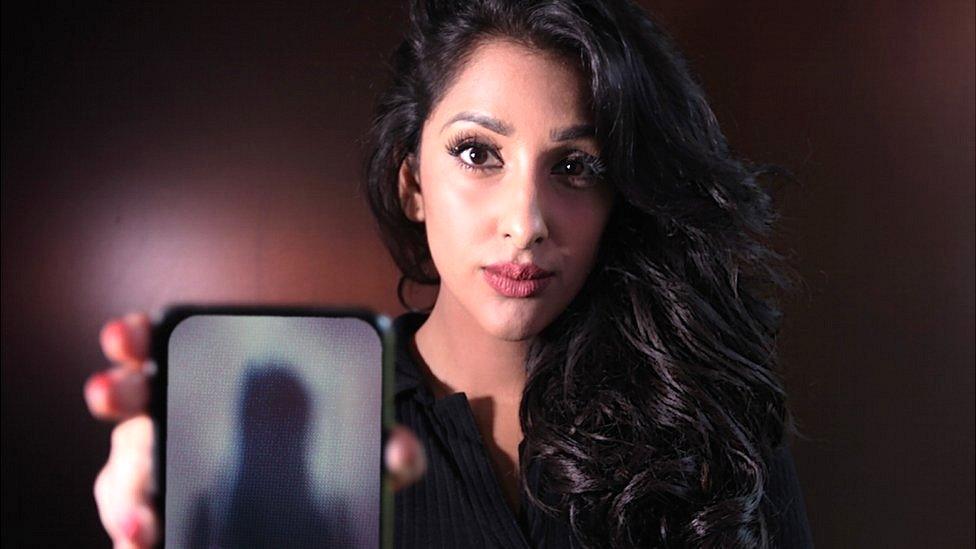Hospital seclusion: ‘I’ve been treated like an animal’
- Published
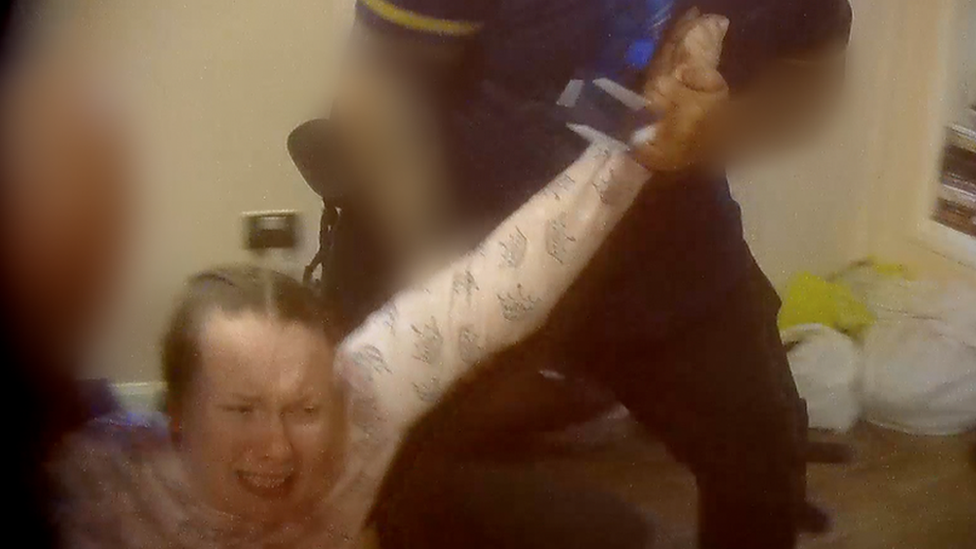
Harley was restrained and dragged into a seclusion room at a mental health hospital
Evidence of abusive and inappropriate treatment of vulnerable patients at a secure mental health hospital has been uncovered by BBC Panorama. One young woman was locked in a seclusion room for 17 days, was then allowed out for a day, only to be hauled back in for another 10 days. Staff - who are paid to provide round-the-clock care - described her as a "cancer" who "needs a good thrashing". She and her family have agreed to share their story.
Warning: This story contains references to self-harm
Harley was sitting on the floor wearing pink pyjamas, with her hair tied up in neat braids, when hospital staff piled through the door one after another.
Two male nurses grabbed her by the arms.
"You're not giving me a chance to work with you," she screamed.
"Let me get up."
But it was no use. Managers at the secure mental health hospital had decided there would be - in their words - "no negotiation".
As she struggled, other nurses and support staff joined in. With her arms, legs and head restrained, she was pinned to the floor, face down.
Secret filming by BBC Panorama captured the moment the 23-year-old was forced into a seclusion room at the Edenfield Centre in Prestwich, near Manchester. The hidden camera had already recorded staff justifying their actions and agreeing they would not try to reason with her this time.
"I can't believe you've done this again," Harley sobbed. "You didn't even give me a chance."
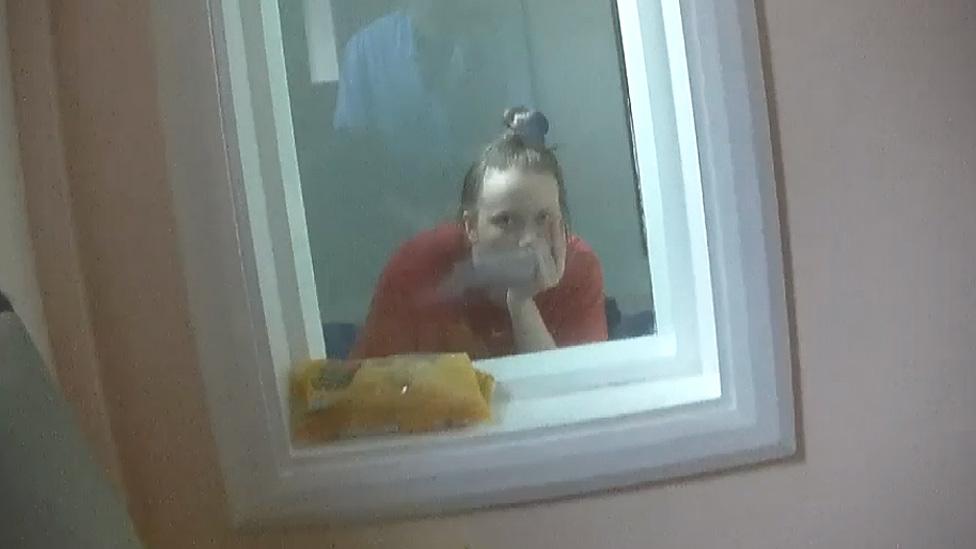
Harley was kept in seclusion
She had already spent much of the past fortnight locked in a bare room, with little more than a mattress on the floor. The walls are scrawled with marker pen. On one side, there is a locked window that lets in natural light, but no fresh air. On another, an observation window runs almost from floor to ceiling.
"They're doing this to break me," Harley had said on one occasion from behind the thick glass, in a state of growing distress.
"It was disgusting, they threw me in there," she later told a support worker. "I've been treated like I'm an animal."

Undercover Hospital: Patients at Risk
A BBC Panorama undercover investigation has found evidence that a secure NHS psychiatric hospital is failing to protect some of its vulnerable patients.
Available now on BBC iPlayer(UK Only)

Panorama's undercover reporter was told that Harley had previously been aggressive towards staff - but, this time they said she was being isolated for screaming and being verbally abusive.
Seclusion should only be used when it is of "immediate necessity" to contain behaviour that is likely to harm others, with patients locked away for the shortest time necessary, guidelines say.
England's independent healthcare regulator, the Care Quality Commission, says it should only be used in extreme cases - while the government has said the use of restrictive methods in hospitals should be reduced.
But research by BBC News has found the numbers are steadily increasing.
In 2016-17, seclusion was used on 7,720 occasions. That number had risen to 14,164 by 2020-21 - an increase of more than 80%.
Longer stays in seclusion - ranging from one to three months - also appear to be increasing, according to NHS data.
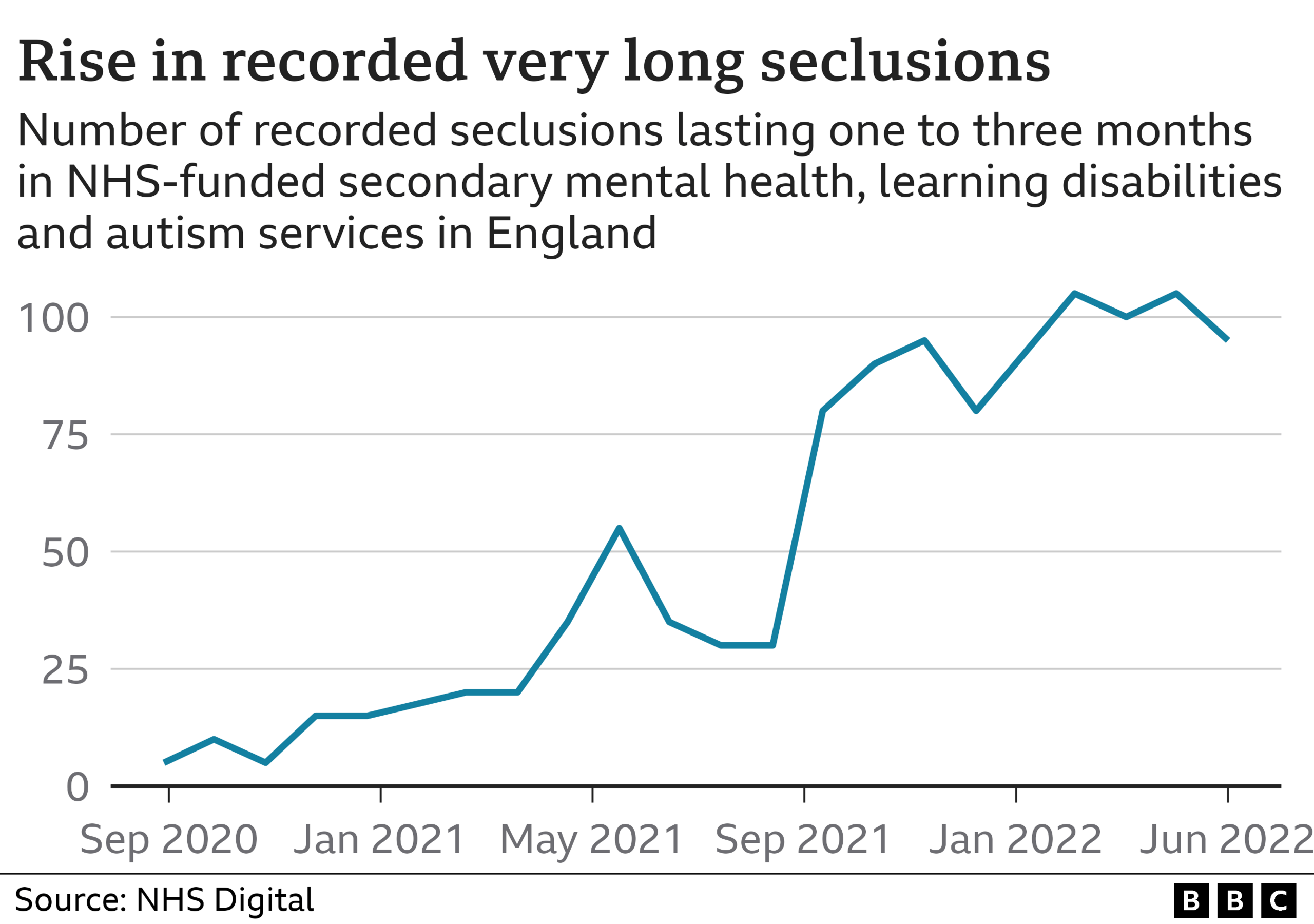
Harley had been detained in a secure unit under the Mental Health Act due to serious and sustained self-harming.
For her family, Edenfield had offered the promise of high-quality, tailored care in a safe setting.
The result, they hoped, would be her rehabilitation and release.
Harley had first self-harmed at primary school and would sometimes struggle to contain her emotions and behaviour.
A doctor later diagnosed autism. The developmental disability affects people in different ways, but can create difficulties with social communication and make some situations overwhelming.
From the age of 12, she bounced between psychiatric hospitals, special schools and residential homes. But in between the bad times, there were cherished childhood moments.
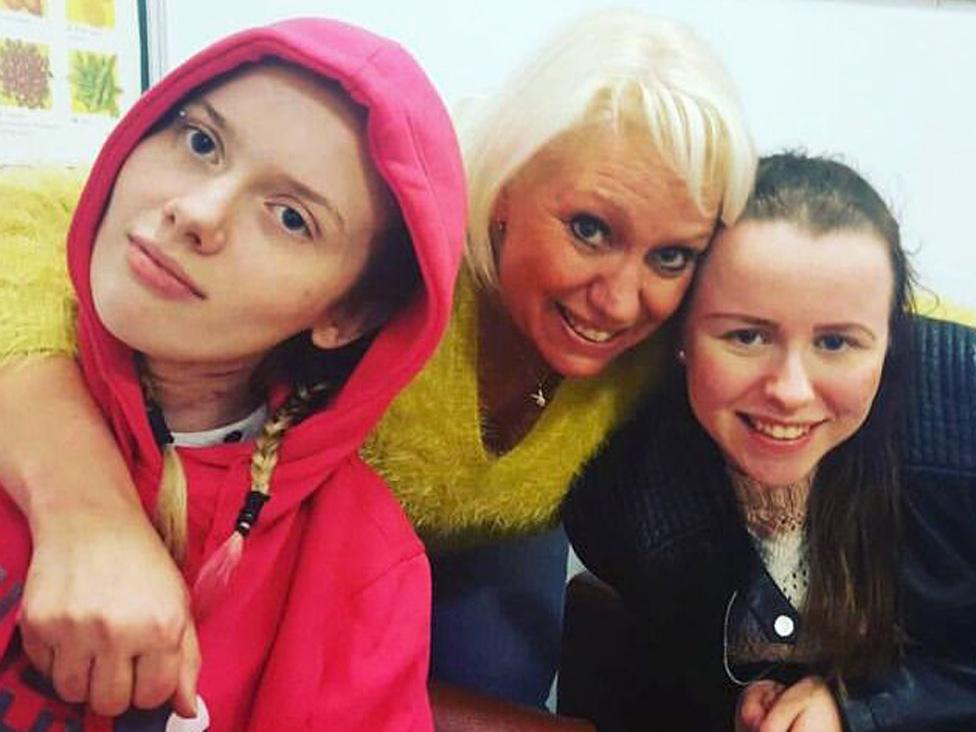
Harley, mum Michelle and sister Tiana
Her sister Tiana remembers Harley's boundless energy for outdoor adventures - climbing trees and scouring the shore for starfish on trips to the seaside.
The sisters were strikingly similar and shared almost everything, including a bedroom.
"People would always say we were twins, because we've got the exact same bright blue eyes," says Tiana.
Despite the disruption, there were glimpses of typical teenage experiences, like shopping trips with her family, hours spent doing make-up and taking selfies, and even a prom with a glamorous ball gown.
The family remained hopeful she would one day return home, and the chances seemed to be improving with therapy in her late-teens.
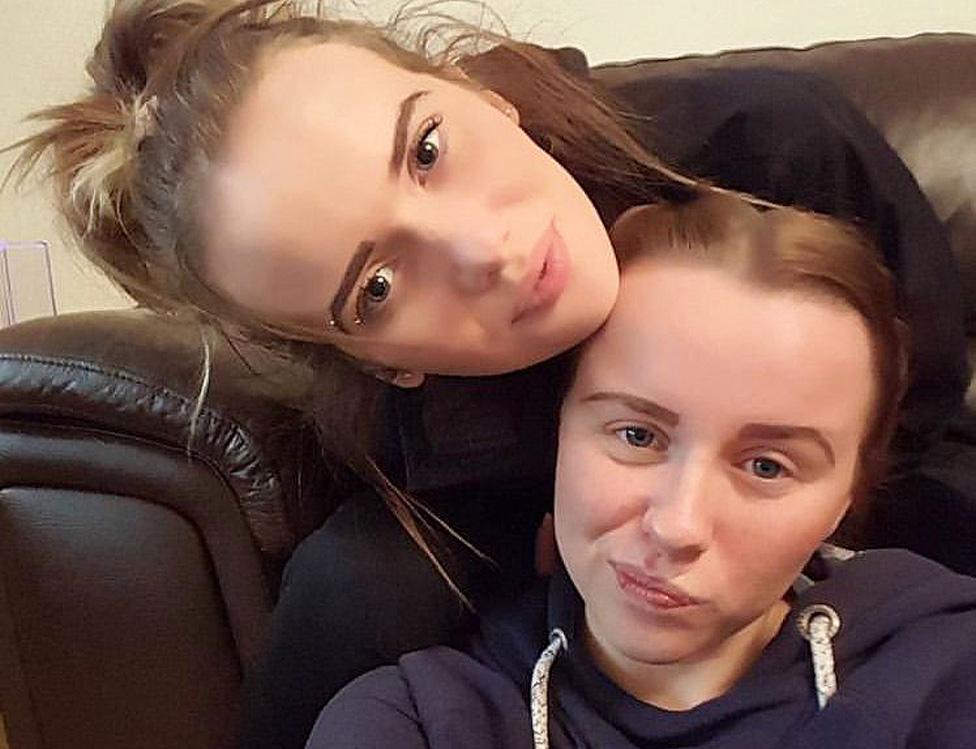
Harley and Tiana together
But things deteriorated rapidly when she turned 18 and moved to a hospital with other adults. Her family believes the transition, and a lack of support, triggered a crisis.
"It was like my whole world crashed down again," says Michelle. "She was ready for coming home, but now really [that] isn't an option."
The transfer to Edenfield gave fresh hope. Michelle was told it was an "all-singing, all-dancing" hospital, with "one of the best doctors" in the region.
"You're gonna come out a better person," she reassured her daughter.
But Harley soon began complaining of poor treatment by nursing and support staff. In the three months BBC Panorama was filming, Harley was placed in seclusion three times.
In one 28-day period, she spent 27 days in a seclusion room, sometimes with short breaks and with only one day out after the first 17 days.
Harley believed she was often deliberately antagonised.
"Staff provoke a patient, and then my reaction is used against me," she says. "It's disgusting."
She told her family: "They're doing it because they all hate me."
It put her mother, Michelle, in an impossible position. Should she believe her daughter or the professionals paid to provide round-the-clock care?
She told Harley she must be mistaken. "They don't hate you… they're there to help you."
Now, in light of Panorama's evidence, she feels like she betrayed her daughter.
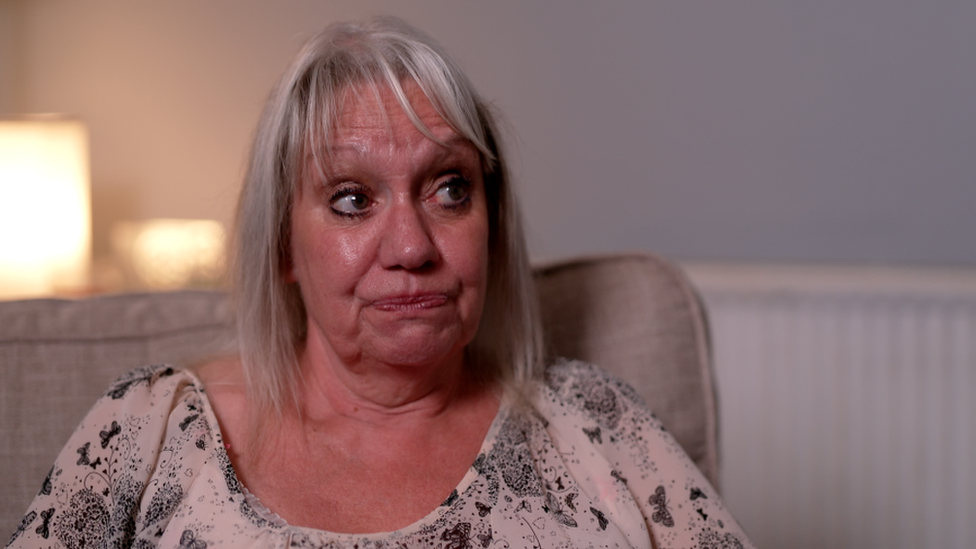
Harley's mother believed Edenfield was an "all-singing, all-dancing" hospital
Secret filming captured staff repeatedly discussing Harley in derogatory terms, and describing her using the most extreme expletives.
One support worker told colleagues that she was "the cancer of the ward".
Discussing her case, a nurse suggests: "Send her to prison, she'll soon be brought down a peg or two."
"She needs a good thrashing," she adds.
On one occasion, the undercover reporter was told by another nurse that staff had asked managers to keep Harley in seclusion, "because everyone's refusing to work with her".
"As bad as that sounds, they need a break from her."
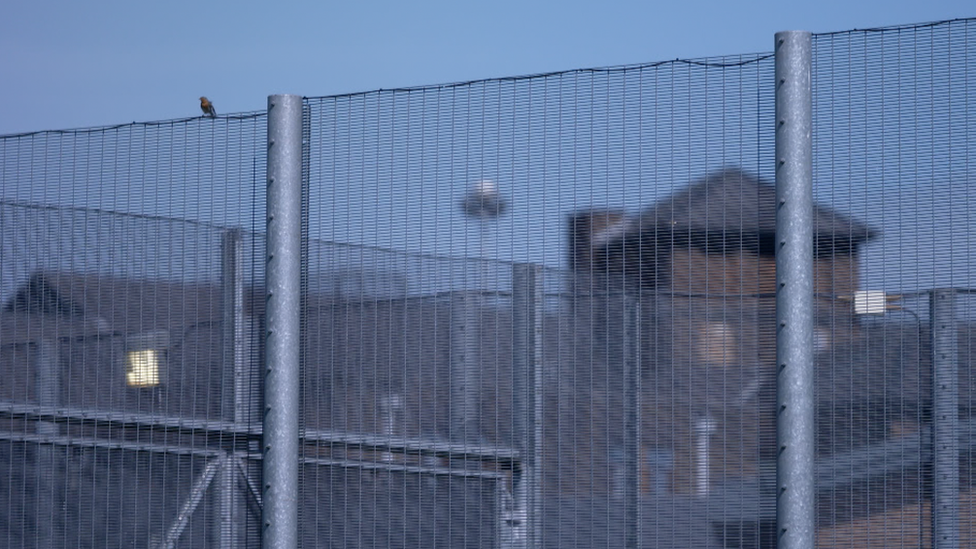
Harley had been held at Edenfield for about two years
We showed two experts the undercover footage - and both told us of their concerns.
"You cannot deprive somebody of their liberties because staff are fed up with her," explained consultant psychiatrist, Dr Cleo Van Velsen. What happened was "totally against any kind of policy with regard to seclusion."
And John Baker, a professor of mental health nursing at the University of Leeds, said it felt like staff appeared to have had "no other plan apart from to keep [Harley] locked up for days on end".
Both also - having seen the footage - questioned the way Harley had been restrained. "It's not a safe restraint, I don't think," Dr Van Velsen said. "It's chaotic. I wasn't there, so all I can say is, if they did decide it was necessary, they didn't do it very well."
Prof Baker added: "I don't think there's any need for that at that moment in time. It's not like she was harming herself or harming other people."

Information and support
If you are suffering distress or despair, details of help and support are available here.
At another point in filming, Harley cries out for more support.

"I'm struggling with my thoughts… and I'm on my own with it," she can be heard to say. "No-one's helping me."
A nurse then asks if she has tried talking to anyone.
"[There's] no point in talking about it," Harley replies. "I just can't deal with this place… it's killing me."
Her sister, Tiana, agrees.
"If anything [the staff] are the ones making her worse and it's evident by the footage that they don't care," she says.
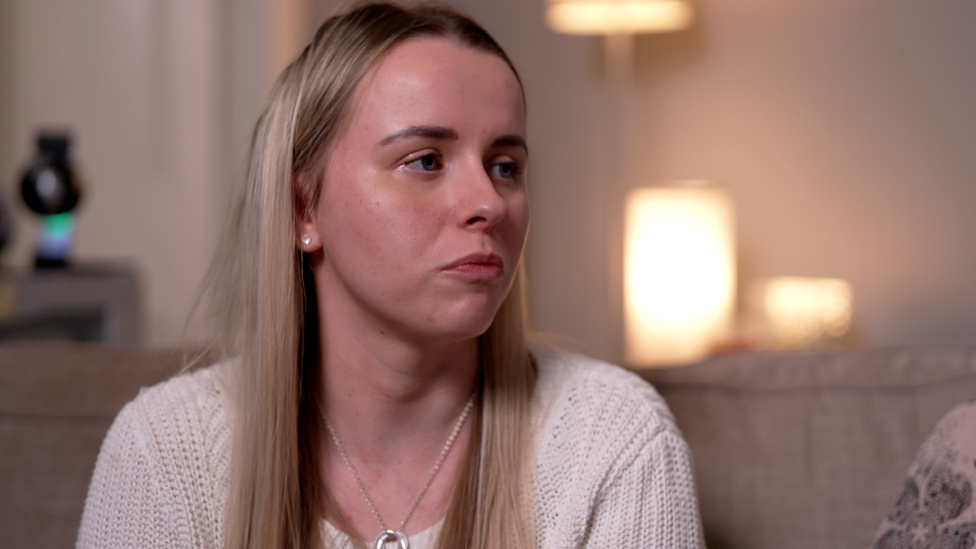
Tiana believes Edenfield had made her sister worse
Greater Manchester Mental Health NHS Foundation Trust - which runs Edenfield - said it was taking the allegations "very seriously" and had taken immediate actions to protect patient safety.
A number of staff members have been suspended, and the trust said it was working with Greater Manchester Police, NHS England and the Care Quality Commission. An independent clinical review of the hospital has also been commissioned.
The trust said: "We owe it to our patients, their families and carers, the public and our staff that these allegations are fully investigated to ensure we provide the best care, every day, for all the communities we serve."
In a statement, the Department for Health and Social Care said the use of force, including seclusion "must always be used proportionately, in accordance with the law, and only ever as a last resort".
During Panorama's filming, Tiana formally complained about the excessive use of long-term segregation and seclusion, alleging that it breached guidelines.
Within days, Harley was moved to another hospital.
But Tiana is worried her sister's experience at Edenfield will have lasting impacts, leaving her distrustful of hospital staff and more likely to lash out.
"She's traumatised by the way they handled her."
Related topics
- Published26 September 2022

- Published13 June 2022
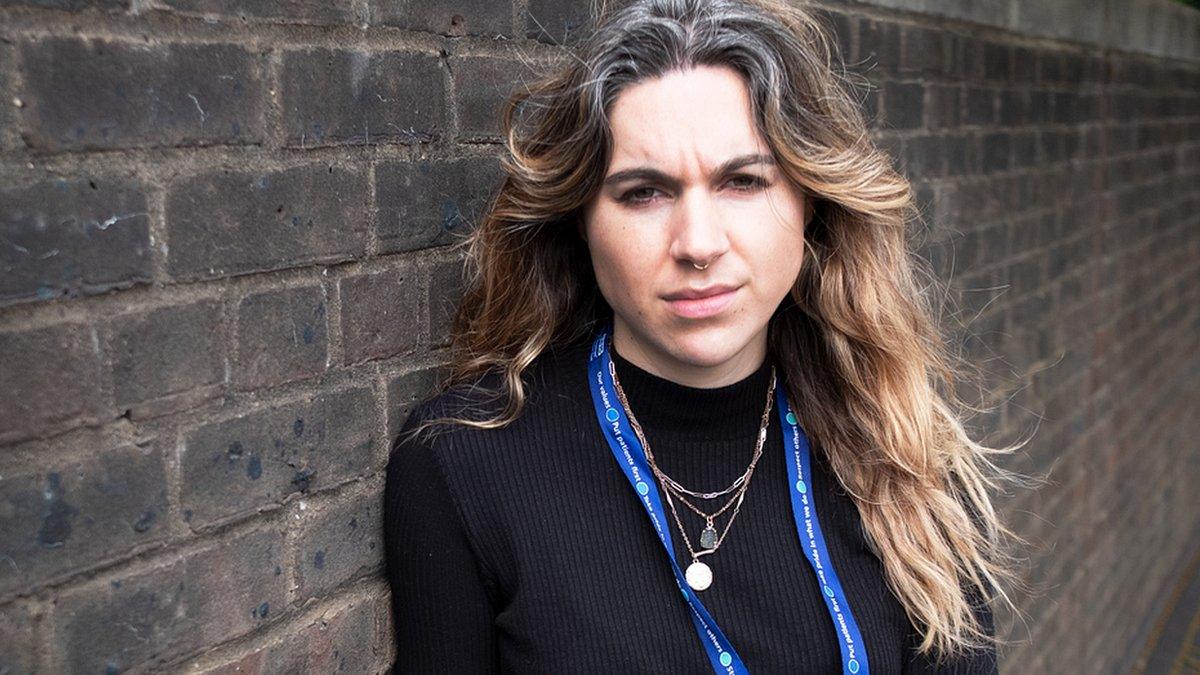
- Published22 August 2022
